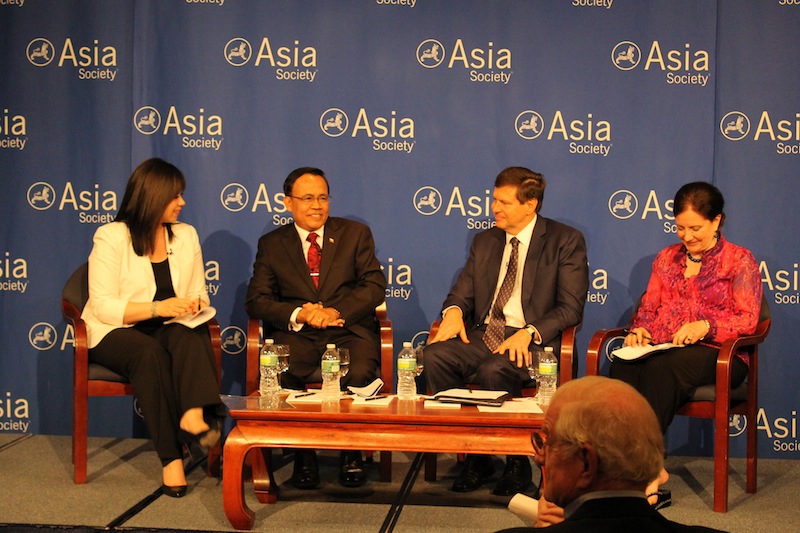Article by William Kustiono
Edit by Yvonne Lo
On June 26, 2013, Asia Society hosted a discussion about the future of Myanmar during its government’s transition. Joining us is Frank G. Wisner, the Foreign Affairs Advisors at Patton Boggs, Ambassador U Kyaw Tin, the Permanent Representative of Myanmar to the United Nations, Howard (Ike) Reed, the Director for Mainland Southeast Asia at the U.S. Department of State, Priscilla Clapp, a retired Minister- Counselor in the U.S. Foreign Service, Suzanne DiMaggio, the Vice President of Global Policy Programs at Asia Society. The topic of the discussion is about path to democracy, reducing the corruption, ending the conflict, and building the country’s economy.
Myanmar’s government controlled by military since 1962, during this time there has been several conflicts about democracy and although there was a free and fair election in 1990, the government is still ruled by military. In 2008, under the Burmese constitutional referendum, the government will ensure creation of the democracy. Myanmar’s name changed from the “Union of Myanmar” to the “Republic of the Union of Myanmar” The conflict in Myanmar ended after the military junta dissolved in 2010.
Ambassador U Kyaw Thin further explained about what happened after the military dissolved in 2010. There has been a change in policy and a new election, there was a lot of skepticism about this election but after the election ends there was a lot of sincerity from people. Since 2011, there has been improvements in Myanmar, the government has a new constitution which will transform into democracy, it will eventually ended the military government and create a credible and active parliament. The new constitution will also provides more civil rights, freedom of speech, and removal of Myanmar’s censorship.
Priscilla Clapp added several comments about this improvement in Myanmar. She commented that Myanmar’s progress is moving slower. When she was in Myanmar in 1999, she saw there has been a plan for change in the government. The Burma’s roadmap to democracy also known as the 7 Step Plan is the key to restore the democracy in Myanmar. Priscilla also commented the new government need to move fast in 5 years period and continue to rebuild Myanmar after the conflict ends. Because this is Myanmar’s first democracy after over five decades in military, there are many things need to reform. And if people did not see any change during the five-year period, then there might be a rising conflict again.
Ambassador U Kyaw and Howard Reed also suggest that Myanmar should follow Indonesia as an icon in ASEAN. Indonesia’s economy has been increasing steadily under the leadership of President Susilo Bambang Yudhoyono (SBY). Indonesia has similar background with Myanmar, both of them have a history of a government that is based on military. In the modern days, although Indonesia has a military custom, the parliament is deciding its own decision without any help from the military. Myanmar on the other hand needs to reform the committee because the military has embroidered for more than five decade in the committee. It is hard to change the committee’s mindset because the role of military in the country is still cohesive. The committee is now facing many challenges such as conflicts, peace process, and cease-fire. Ambassador U Kyaw explained that the government is very serious to end the conflict to boost the economy in Myanmar. The government needs to step up and solve this problem among the ethnic groups, this is a serious case if they want to turn Myanmar into a prosperous country.
There was a conflict about Buddhist and Muslim in Myanmar that was brought to the discussion. Ambassador U Kyaw explained that the conflict is about immigration problem. It is also a culture clash between Buddhism and Muslim. The president is going to solve this issue because it is common in Myanmar to have many religions. Another issue that was brought to the speaker’s attention is about Aung San Suu Kyi, the Burmese opposition politician and chairperson of the National League Democracy in Burma. Priscilla commented that Suu Kyi is a great influencer and she is also a great and remarkable leader. About the election and her presidency in the next 2015 election, Priscilla cannot further comments because the decision is up to the parliament.
The discussion was ended by a remark from Ambassador U Kyaw about the Myanmar’s expatriates in United States. The government of Myanmar encourages the expatriates to continue their support to their home country. Howard is also commented that U.S. government is currently working on the Permanent Residence status for the Myanmar expats who want to stay in the United States. Priscilla also commented that the bonding between Myanmar people in United States and in their home country is strong. It is advisable to continue maintaining the connection between expats and their relatives in Myanmar in order to rebuild their country from the conflicts.

Leave a Reply